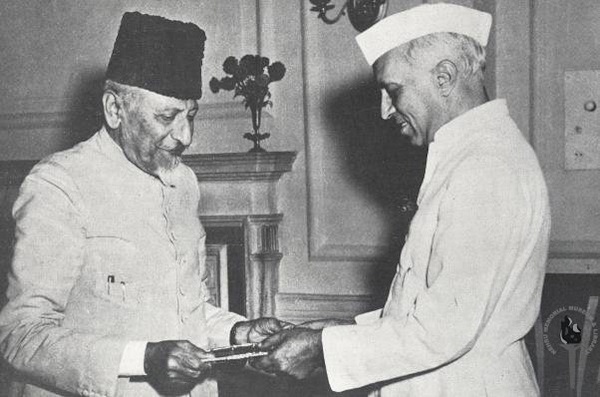Netizens have begun to urge Union home minister Amit Shah to take time out and reply to Brinda Karat of Communist Party of India (M) who has a problem with a service officer for airing his views on Abrahaminsation of Indian education system, among other fields.
Brinda Karat has not only written to the home minister but also filed a police complaint against M. Nageswara Rao, a senior police officer, stating that he had made the “most outrageous charges against heroic freedom fighter Maulana Abul Kalam Azad…” among others.
Rao believes that India’s educational system is embedded with outright hostility to Hindu beliefs and it all begun with India’s first education minister, Maulana Abul Kalam Azad. It all assumes relevance now that Modi government has announced a New Education Policy (NEP).
Twitteratis are quick to point out that being in service doesn’t take away Rao’s rights as a citizen. He is offering his services for his livelihood, not surrendering his right to think and express his view as a citizen.
It has also been pointed out, tongue-in-cheek, that most police officers of Kerala, where Communists are presently in power, carry card of the party.
Brinda Karat (see image above) has also been reminded that it was she who supported JNU’s “Bharat Tere Tukde Tukde Honge” sloganeers in the name of freedom of expression and that she is being selective.
Rao has mentioned a list of India’s education ministers in independent India’s early decades, beginning with Azad, his understudy and successor Humayun Kabir, MC Chagla, Fakhruddin Ali Ahmed and Nurul Hassan.
MyIndia.net has made some relevant points in this regard and we quote:
“It’s instructive to note that all of these leaders were devout Muslims and committed to Islamic ideals.
“Maulana Azad was from a family of Afghan origin that had lived in Bengal for many years. His father had left India after the 1857 War and settled in Makkah. His mother was from Medina and the daughter of a prominent cleric.
“The family settled in Calcutta when the Maulana was a child. He was home-schooled in Islamic theology and Islamic jurisprudence. It may be interesting that all of formal education in India was placed in the hands of a man who had never undergone education in a regular school or college and whose primary languages of intellectual discourse were Arabic and Persian.
“He demonstrated precocious intelligence and had advanced in his studies to be able to contribute to a literary magazine at the age of 14.
“Having had a brief look at his background, let us see what his opinions and positions were. Some of his opinions
· He had the idea of India and Pakistan sharing a common United Army to guard their borders. Given that the Royal British Indian Army was dominated by Muslim officers, one wonders what position Hindus would have had in the sub-continent if this situation had come to pass.
· His opposition to Partition was based on his conception of a give and take transaction between Islam and the Indian sub-continent. ‘For 1100 years, we handed over our wealth to her and she unlocked the door of her own riches’. By ‘our wealth’ one assumes he means the message of Islam and in return for which, Muslims of the sub-continent obtained access to the human and natural resources of Hindustan.
· Maulana Azad was a firm Pan-Islamist. In an address rallying support for the Khilafat movement – ‘If even a grain of the soul of Islam is alive among its followers, then I should say that if a thorn gets stuck in a Turk’s sole in the battlefield of war, then I swear by the God of Islam, no Muslim of India can be a Muslim until he feels that prick in his heart instead of sole because the Millat-e-Islam (the global Muslim community) is a single body’.
· His vision of Muslims as global citizens of the Caliphate. When the Ottoman Caliphate fell, he and other Indian clerics gave a call to hijirat – that Muslims should not live under an infidel British rule, but immigrate to Afghanistan, where a Muslim ruled.
“Given his background and his opinion, is it not possible that if history writing of India were under his supervision, there would be a natural tendency to represent the Islamic rule in favourable terms?
“His successor, Humayun Kabir, was Western educated and was much more conversant in Urdu and English. He served for several years as Maulana Azad’s deputy and can be assumed to have shared many of the Maulana’s views.
“The first 15 odd years of Independent India were thus handed to Education Ministers with the views of a Muslim cleric. Is it any wonder that when the famous Nehruvian scientific temper is invoked, the subject of its scrutiny is almost always the Hindu and his religion?
“We could go on and examine the views of successive occupants of the Education Ministry such as MC Chagla, Fakhruddin Ali Ahmed and Nurul Hassan, but suffice to say that they were from the same social milieu of upper class North Indian Muslims, the same class that was at the forefront of the Pakistan movement.”
The article also lists out the education ministers in Kerala and note that only two Hindus but both were atheists.
That 50% of Hindus of Kerala never had any representation in the Education ministry.


